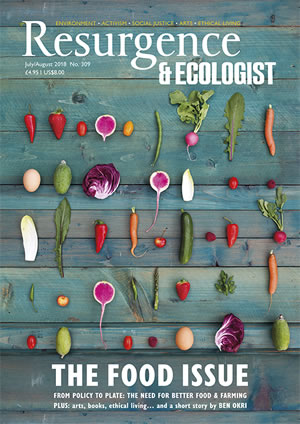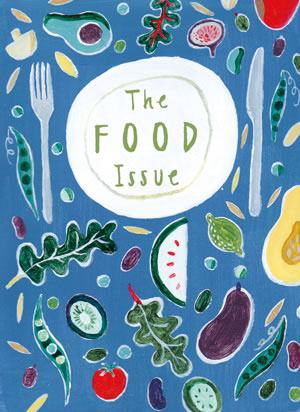Whatever our background or beliefs, food is a mainstay of our culture and community. That is perhaps truer than ever in today’s multimedia age, where television producers vie for the latest food formula that will woo the viewers, from bakery competitions to the latest antics of celebrity chefs; where newspaper supplements present new cuisine with glossy photography that rivals any fashion spread; and where some mobile phone users seem to spend as much time posting online images of what’s on their plates as actually eating it.
Stripped of all such flam, however, what we eat, how it is produced, and what it says of our relationship with our planet – and one another – matters. Hence our decision to devote much of this issue of Resurgence & Ecologist to food and farming.
In Britain, as in much of the rest of the world, we urgently need to rethink our food and farming systems. The food campaigner Hugh Fearnley-Whittingstall argues in our main interview why we need to move away from unsustainable levels of meat production and consumption towards a more vegetable-based diet. And while our individual ethical and lifestyle decisions matter, Sue Pritchard contends, the present political climate – notably the aftermath of Britain’s decision to leave the European Union – means that policymakers must seize the moment to produce new, coherent and consistent food and farming policies. Herbert Girardet reminds us of the need for a regenerative approach to food production and distribution, both in our countryside and in our cities, while other contributors to this issue detail both the damage that modern ‘agro-industry’ has been doing to wildlife and countryside, and the steps that must be taken to reverse it.
Today, while millions still go hungry, we are turning over much of the planet to unsustainable environmentally damaging food production for richer nations. This, together with food waste and food poverty in the so-called developed world, is a reproach to us all, and should be a spur for greater social and environmental justice. Satish Kumar articulates this in his regular Choices column – and you can hear him in the first epidosde of our new Resurgence Voices podcast.
If all this sounds excessively worthy, it need not be. Food, in its production and consumption, helps define us and our relationship with Nature. The Buddhist teacher Thich Nhat Hanh has said: “If you truly get in touch with a piece of carrot, you get in touch with the soil, the rain, the sunshine. You get in touch with Mother Earth, and eating in such a way you feel in touch with true life, your roots, and that is meditation. If we chew every morsel of our food in that way we become grateful and when you are grateful, you are happy.”
Virginia Woolf put it another way: “One cannot think well, love well, sleep well if one has not dined well.” So we have articles in this issue that celebrate our relationship with food, and the soil from which it springs.
Elsewhere, we present a rich menu of reading that is not food-related. Our short story by Ben Okri, illustrated by Rosemary Clunie, is a work of magical beauty. And in our arts and reviews sections, spiritual and intellectual nourishment abounds. As always, we wish you bon appétit!








